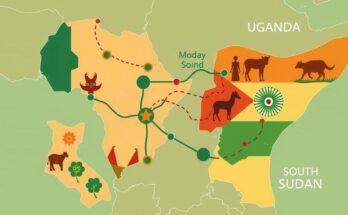Cameroon is encountering escalating violence and political tension with armed conflicts in Anglophone regions, ethnic violence in the South, and jihadist threats in the Far North as it heads toward the October presidential elections. President Paul Biya, in power since 1982, is expected to run for another term, amid criticism from opposition leaders. Political divisions within opposition factions pose challenges to their effectiveness in the elections.
Cameroon is currently experiencing a surge in violence and political unrest as it approaches the presidential elections scheduled for October. The intensifying conflict within the Anglophone regions, coupled with intercommunal clashes in the South and heightened jihadist activities in the Far North, has created a particularly volatile environment ahead of this critical electoral period.
The Anglophone conflict intensified recently, with the Cameroonian military engaging in multiple clashes with separatist fighters throughout February. Noteworthy incidents include a raid in Ndop on February 9 that resulted in the deaths of two rebels, and claims of the military killing a key commander on February 16, although separatist sources assert he was captured alive. Tensions are further aggravated by reported civilian casualties, suggesting that separatists are still conducting ambushes and kidnappings in rural sectors despite government offensives.
In the South, ethnic violence has flared up, particularly in the Meyo-Centre village. Riots began on February 20 when indigenous residents attacked businesses belonging to outsiders, incited by the murders of two locals under mysterious circumstances earlier in February. Local authorities are attempting to stabilize the situation through peace meetings and the removal of roadblocks, as the region confronts rising ethnic divisions fueled by social media rhetoric.
The situation in the Far North has also deteriorated, with increased activity from Boko Haram and ISWAP militants. The army reported killing five Boko Haram fighters on February 7, while multiple civilian kidnappings have occurred, particularly in the Mayo-Sava and Mayo-Tsanaga divisions. Protests by local ethnic groups regarding farmland expropriations for national park development and government inaction regarding floods have compounded local unrest, highlighting a growing frustration among the populace.
As the October presidential election approaches, President Paul Biya, who has been in power since 1982, hinted at his intention to run for re-election during a recent speech on Youth Day. He encouraged young citizens to reject opposition groups he described as destabilizing forces. However, opposition leaders, including Maurice Kamto and Cabral Libii, criticized Biya’s extended rule and claimed a history of unfulfilled promises. Yet, fragmentation within opposition parties complicates their ability to pose a real challenge to Biya’s ruling CPDM party as the country prepares for a potentially contentious election cycle.
In summary, Cameroon is facing a complex convergence of challenges, including escalating violence in its Anglophone regions, ethnic conflicts in the South, and growing jihadist threats in the Far North. As political tensions rise ahead of the October presidential election, the ruling party’s dominion remains strong despite opposition criticisms and internal divisions. The looming election period is expected to be fraught with tension, potentially heightening instability within the nation.
Original Source: www.cameroon-concord.com




